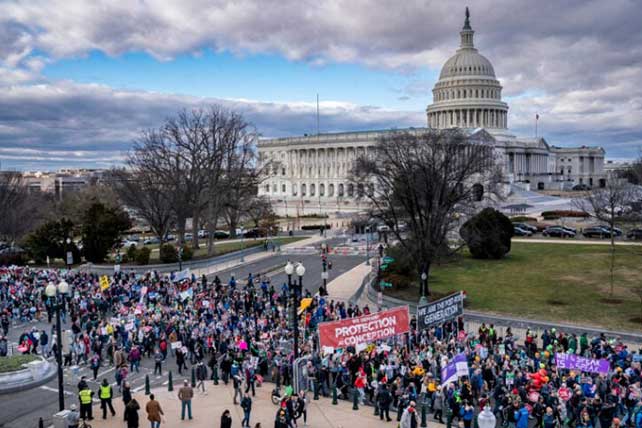(RNS) — Last January, March for Life participants gathered for the first time after the Supreme Court overturned Roe v. Wade, celebrating a long-sought victory even as they shifted their focus to the state level — the new battleground in the enduring abortion debate.
A year later, after a series of disappointments for the organization, in which more than half a dozen state ballot initiatives strengthened access to abortion, abortion opponents will gather again for the annual D.C. march, even as March for Life also plans at least 16 state-level marches this year, double that of 2023.
“Yes, Roe has been overturned for a year and a half, which returns the question to the American people,” said Jeanne Mancini, president of March for Life, in an interview. “But are we done building a culture of life? Is abortion unthinkable? No. So we continue marching at the states, at the national level.”
Mancini said she expects to see over 100,000 anti-abortion activists appear Friday (Jan. 19) at the 51st March for Life — whose 2024 theme is “With every woman, for every child” — followed by crowds at the growing number of state counterparts.
Nicole Hunt, life issues analyst for the evangelical organization Focus on the Family, said she plans to be in Washington and also at Colorado March for Life on April 12.
“Given the fact that it is so divided and polarized right now in D.C., it’s very unlikely we’ll see federal legislation that could pass right now,” Hunt said. “I think we’ll see people engaged at both the federal and state level, but I think where we’re going to see the most engagement and the most action is at the state level.”
She believes the anti-abortion movement has improved its fundraising and messaging since 2022, when the outcome of half a dozen state ballot measures did not go their way, including
their most recent loss in Ohio. Abortion opponents are pressing on, Hunt said, with hopes to continue to support “any measure that protects life.”
She noted an upcoming ecumenical gathering at the Colorado Capitol, where they will oppose efforts by abortion rights advocates to gather signatures to support a proposed amendment to include a right to abortion in the state constitution.
“We’ve got the Catholic Church and the Protestants and the pregnancy resource organizations and everybody coming together to say, we need to rally together to turn out folks to speak against this, to have rallies at the Capitol and all of that,” said Hunt.
Mancini expressed gratitude for former President Trump’s opposition to abortion while he was in the White House and his presidential actions that helped lead to Roe’s overturn. But after Trump recently criticized his opponent Ron DeSantis’ signing of a six-week ban on abortion, she praised the action of the Florida governor.
“We applaud him for doing that and all others who stand for life and advance pro-life protection for the unborn and work to serve pregnant women in need,” said Mancini, who noted her organization does not endorse candidates.
She expects anti-abortion efforts on the state level might, at least initially, be more successful than any nationwide proposals to restrict the procedure because “right now, it’s difficult to pass anything with our specific Congress,” she said.
Still, the march route is expected, as it did last year, to follow a path that directs participants past the western face of the Capitol en route to the Supreme Court.
Along that route, Catholics for Choice, which has unfurled banners and used projected lights to protest past anti-abortion events, plans to have placards on display with statistics about the majority of Catholics supporting abortion rights.

